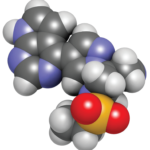Another attendee asked about baricitinib’s approval for COVID-19 use, given the safety concerns. “It was approved for emergency use in COVID, and yet we now have an added risk for thrombosis across the class,” the questioner said. “This seems to be inconsistent and contradictory.”

Dr. Golding
Amit Golding, MD, PhD, a medical officer in the rheumatology and transplant medicine division, said the reasoning had to do with the duration of treatment. “We recognize the concern,” he said. “The updated safety information on JAK inhibitors refers to risk accrued over years, whereas the baricitinib emergency use authorization for treatment during COVID is limited to 14 days.”
A post-marketing safety study is required for baricitinib (to be completed by October 2026), but no such study was required of upadacitinib when it was approved, the FDA officials said.
In the end, Dr. Rajpal said, the FDA has had to weigh all the benefits and risks in the face of limited data for the other two medications. “All of these products share a similar mechanism of action,” he said. “In the absence of a good understanding of which targets are associated with specific risks, it is difficult to determine the relevance for specific safety outcomes. Also, none of the other JAK inhibitors has the extent or the rigor of the randomized controlled trial data to reliably rule out the risks identified in ORAL Surveillance,” the post-marketing study.
Avacopan Approval
Nadia Habal, MD, a clinical reviewer in the FDA’s rheumatology and transplant medicine division, reviewed the FDA’s rationale in another approval that has generated interest: avacopan, a complement 5a receptor antagonist approved in October for ANCA-associated vasculitis when used with standard therapy.2 The drug was approved after a review committee chose to support approval for the drug by a slim margin, 10 votes to 8, and with the caveat that the drug doesn’t eliminate the need for systemic glucocorticoids.

Dr. Habal
Dr. Habal said complexities in the trial’s design made it a challenge to interpret the data. The primary endpoint of remission at 52 weeks was met, but superiority for the drug was not shown at 26 weeks compared with prednisone, a period during which 86% of the avacopan-treated patients received a non-study supply of glucocorticoids.
The committee ultimately decided the safety profile and the risk-benefit profile was adequate, Dr. Habal said. “The division also considered the clinical circumstances where additional flexibility may be warranted with respect to the acceptability of uncertainties,” she said. “ANCA-associated vasculitis is a rare and serious disease associated with high morbidity and mortality, for which an unmet medical need remains.”



